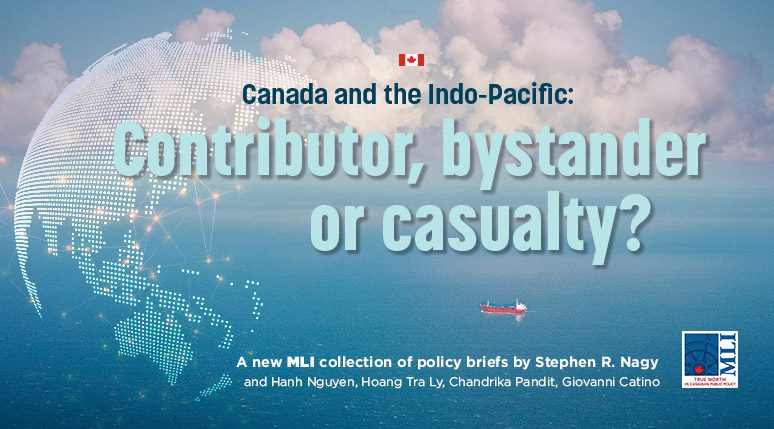 OTTAWA, ON (October 25, 2021): Despite the pivotal importance of the Indo-Pacific, Canada remains on the outside looking in. An often-promised Indo-Pacific Strategy for Canada has not materialized, while aligned or allied countries in the region forge ahead with their own plans. A course correction is urgently needed if Canada is to join its partners across the globe in managing the challenges and opportunities in the Indo-Pacific.
OTTAWA, ON (October 25, 2021): Despite the pivotal importance of the Indo-Pacific, Canada remains on the outside looking in. An often-promised Indo-Pacific Strategy for Canada has not materialized, while aligned or allied countries in the region forge ahead with their own plans. A course correction is urgently needed if Canada is to join its partners across the globe in managing the challenges and opportunities in the Indo-Pacific.
A new MLI collection of policy briefs, titled “Canada and the Indo-Pacific: Contributor, bystander or casualty?” provides an overview of some of the key issues in the Indo-Pacific and how Canada can play a constructive role in the region. This publication was authored by MLI’s newest Senior Fellow, Stephen Nagy, and features significant contributions by co-authors Hạnh Nguyễn, Hoang Tra Ly, Chandrika Pandit, and Giovanni Catino.
The Indo-Pacific hosts many of the world’s largest economies, most populous countries, most significant trading partnerships, many of the most critical sea lines of communication, and more. As Nagy writes in the introduction to the collection, “what happens in the region has spillover effects in the rest of the world, including Canada.”
Indeed, the foundations of our way of life are being tested by the rising challenges posed by China. Nagy argues that “it is proactive for states to ensure that China’s development does not reshape the Indo-Pacific region in a manner that erodes the existing rules-based order or marginalizes their national interests.”
The six policy briefs discuss:
- What Canada can learn from how other middle powers are managing the challenges and opportunities in the Indo-Pacific;
- Canada’s interest in supporting a free and open digital economy in the region;
- How middle powers can contribute to infrastructure and interstate connectivity as an alternative to China’s ‘Belt and Road Initiative;’
- The importance of digital connectivity, particularly in the context of 5G infrastructure development, and how it intersects with the maintenance of the free and open Indo-Pacific;
- Opportunities for middle powers in terms of bilateral and multilateral security cooperation, particularly in South Asia; and
- The role of economic cooperation in safeguarding peace and stability in the region.
Nagy’s briefs suggest that Canada can contribute greatly to the region, including through engagement across trade, investment, security, diplomacy, humanitarian assistance, infrastructure development, and more. Other regional middle powers provide both lessons and opportunities for Canada.
According to MLI’s Indo-Pacific Program Director, Jonathan Berkshire Miller, “Nagy’s collection demonstrates and reinforces the necessity of a robust and imminent Canadian strategy for the Indo-Pacific.”
“While many other partners and allies in Europe and Asia have released strategies for the region, Canada has been largely silent about its intentions.”
Ultimately, Canada must be active in the region if it is to secure its interests and work alongside our allies to reduce the risks emanating from China’s revisionism and belligerence.
“If countries hope to take full advantage of the region’s potential and ensure that they are not bystanders or casualties to what happens here,” writes Nagy. “They will need to develop a vision for the Indo-Pacific that is based on their national interests and material and diplomatic resources.”
To learn more about how Canada can chart a new course in the Indo-Pacific, read the full paper by clicking the button below.
***
Stephen Nagy is a Senior Fellow at the Macdonald-Laurier Institute and a Senior Associate Professor in the Department of Politics and International Studies at the International Christian University. Concurrently, he is a Research Fellow at the Canadian Global Affairs Institute (CGAI) and a Visiting Fellow with the Japan Institute for International Affairs (JIIA).
For more information, media are invited to contact:
Brett Byers
Communications and Digital Media Manager
613-482-8327 x105
brett.byers@macdonaldlaurier.






